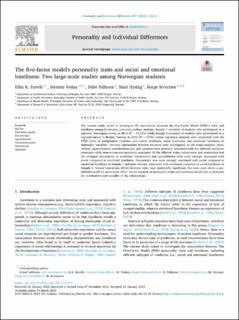The five-factor model's personality traits and social and emotional loneliness: Two large-scale studies among Norwegian students
Journal article, Peer reviewed
Published version

Åpne
Permanent lenke
https://hdl.handle.net/11250/3114318Utgivelsesdato
2023Metadata
Vis full innførselSamlinger
Originalversjon
Personality and Individual Differences. 2023, 207, 112115. 10.1016/j.paid.2023.112115Sammendrag
The current study aimed to investigate the associations between the Five-Factor Model (FFM)`s traits and loneliness among Norwegian university/college students. Sample 1 consisted of students who participated in a national, Norwegian survey in 2014 (N = 13,035), while Sample 2 consisted of students who participated in a regional survey in Bergen, Norway in 2016 (N = 4338). Linear regression analyses were conducted, with the FFM's traits as independent variables and overall loneliness, social loneliness, and emotional loneliness as dependent variables. Two-way interactions between the traits were investigated. In the crude analyses, extraversion, agreeableness, conscientiousness, and openness were inversely associated with the different loneliness constructs while neuroticism was positively associated. Of the different traits, extraversion and neuroticism had the strongest associations to loneliness. Extraversion and agreeableness were more strongly associated with social compared to emotional loneliness. Neuroticism was more strongly associated with social compared to emotional loneliness in Sample 1 and more strongly associated with emotional compared to social loneliness in Sample 2. Several interaction effects between traits were statistically significant, but none were above a predefined cut-off for meaningful effect. Future research on personality traits and loneliness should aim to delineate the mechanisms and causality of the relationships.
